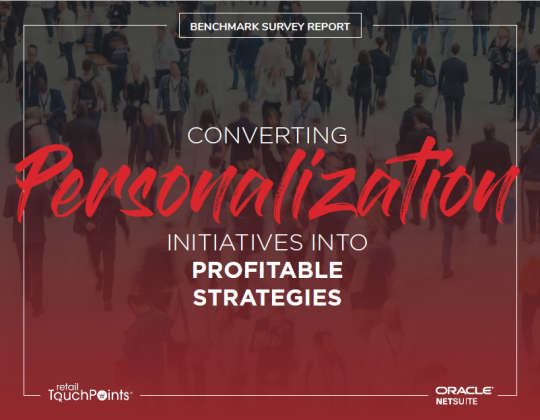
Last week, Retail
TouchPoints unveiled its inaugural Personalization
Benchmark Survey, revealing how retailers have reaped the benefits of
personalization strategies as well as identifying where there is still room for
improvement. With 66% of retailers crediting personalization strategies with
increasing their sales, and 46%
saying that personalization has boosted sales by up to 10%, it doesn’t appear these initiatives will slow down any
time soon.
The RTP team dives
into the findings of the Personalization Benchmark Survey and shares their
biggest takeaways, and a few surprises, from the results.
Debbie Hauss,
Editor-in-Chief: While it’s not surprising that email is the most-used
personalization strategy, it is surprising that more retailers have not
invested in advanced capabilities. Just 33% of retailers scale their email message volume based on
individual customer engagement levels, and only 29% use algorithms to determine which types of personalized
emails to send. It’s great that 79%
are using the customer’s name in emails, but by not honing in on customer
engagement and customers’ specific needs, retailers risk sending irrelevant
communications. What could make matters worse is that retailers seem afraid to
let consumers decide when and how to communicate with them: Only 28% allow consumers to have a say in
how much marketing material they receive via email, mobile and/or direct
mail.
Adam Blair, Executive
Editor: I was happy to see that more than half (57%) of retailers
responding to our first Personalization Benchmark survey keep track of
individual’s customer service history, including complaints, returns and
positive reviews. Without strong customer service and an engaging CX, even the
most sophisticated personalization initiatives will fail. It’s a bit alarming
that only 32% of retailers gather data on social media
activity related to their companies, and I also wonder if organizations are
effectively sharing this information with everyone who needs it — call center
agents, store associates, etc. Given that respondents’ two biggest information
management challenges are maintaining a comprehensive, real-time
customer database and integrating structured and unstructured
data, it’s more than likely that important data is still siloed to a large
extent. Fixing these issues seems like a worthwhile hurdle to surmount if
retailers really want to reap the promise of personalization.
Glenn Taylor, Senior
Editor: Online personalization is still heavily oriented towards products,
with 53% of shoppers providing
product recommendations based on similar customers’ activity. It makes sense
given that online shoppers are more apt to focus on the end result rather than
the journey that often takes place when shopping in a store. But as e-Commerce
continues to evolve in tune with shopper preferences, retailers are going to have
to get creative in personalizing their sites, to go beyond product and make
experiences that feel different for each consumer. I would like to see more
headway down the line from retailers when it comes to offering a digital
personal shopper. Only 22% currently
provide this, but as shoppers demand more curated, individualized online
shopping experiences, I would expect this service will continue to grow.
Bryan Wassel,
Associate Editor: The results of our Personalization Benchmark survey show
how important it is for retailers to communicate with customers. As Accenture
found, 83% of consumers are willing to share data with a
company to enable a personalized experience. The key phrase is “to enable a
personalized experience” — shoppers are overwhelmingly willing to part with
valuable data, provided they know they’re getting something in return. Forming
this mutually beneficial relationship can help retailers tackle their concerns,
such as meeting consumers’ demand for customized 1:1 experiences (the
motivation behind personalization initiatives for 63% of
retail executives) and the need to improve the effectiveness of marketing
campaigns (cited by 47%). By keeping communication channels open
with shoppers, retailers can gather the data they need to be successful while
keeping their customers happy.






